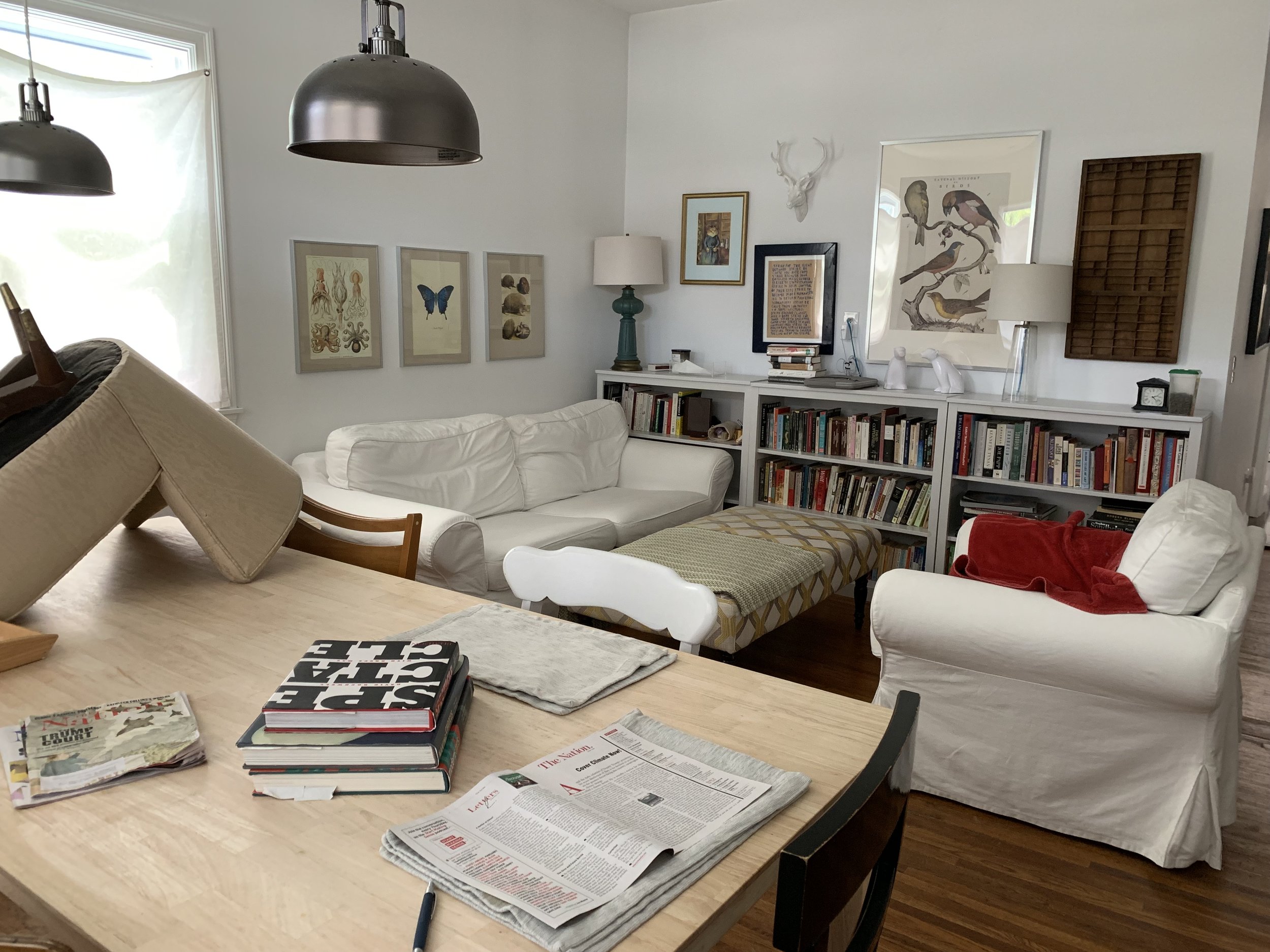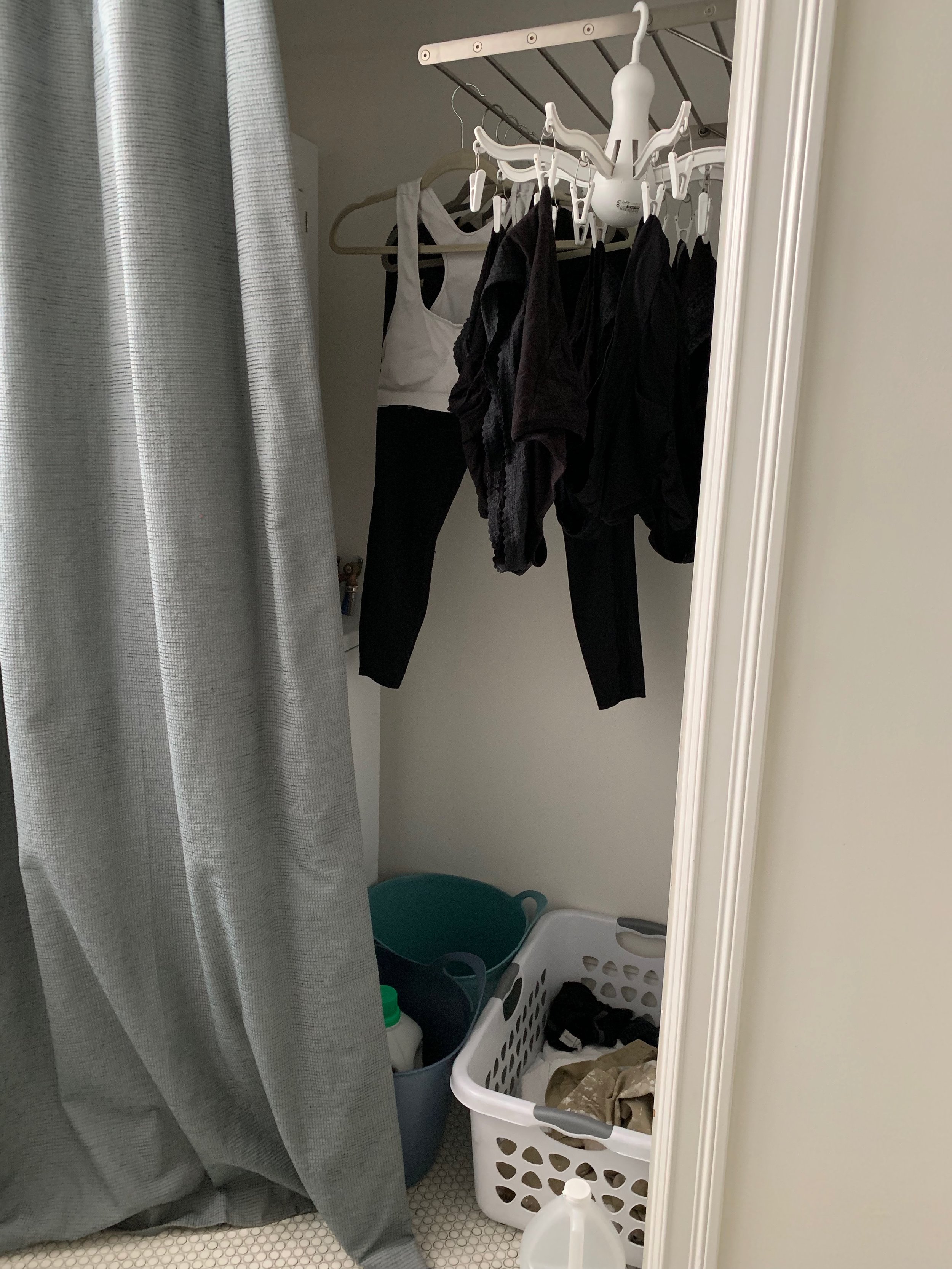MInimalist Shame
I’m experiencing minimalist shame. The apartment is a bit messy lately. Things are out of place or they just don’t have a place so I dump them in my husband’s office. I haven’t cleaned out the fridge in weeks and our “snack drawer” is overflowing with packaging and neglected food. I recently went through all the clothes I have in storage in a smaller size and I’m overwhelmed by how much I have. I just received a shipment of vitamins and it’s pushed my pill drawer to the limit. I have a growing pile of clothes that need to be listed on Ebay, sent to Thredup, or donated (as my body gets smaller, the pile gets bigger). I have some old curtains and sheets in the trunk of the car that need to find a new home. The bathroom is overrun with toiletries and needs a clearout. My husband’s nightstand is stacked with books and New Yorkers. There’s laundry to be dealt with. My husband’s in the middle of fixing our armchair so it’s on the dining room table. And the whole place needs a proper vacuum and dusting and none of the clutter is making that any easier.
These are the times when I think that I’m not really a minimalist, I just want to be, and that there’s a big difference. But just because the house is messy doesn’t mean it always will be. It’s perfectly normal to have an influx of “stuff.” And our “stuff” is all consumables. Prescriptions and toiletries and food and clothes and periodicals. None of these things will stick around for very long, albeit some old things should probably go right away to make room for the new. So I know I will get on top of all of it soon, but it has reached a tipping point.
Even lifelong minimalists have clutter sometimes. It’s part of processing the things that come into our homes. The part I’m having a really hard time with lately is what to do with the stuff that needs to go. Reports tell us that 90% of donated clothes end up in a landfill, so we can’t just donate our belongings guilt-free anymore. Recycling is a far-from-perfect system and not all recyclables are actually sorted properly and recycled. And then there are things that are just broken or no longer useful and have nowhere to go but the trash. You can get creative with weaving tote bags out of plastic ones or fobbing things off on your loved ones, but most of us do create a certain amount of garbage that just can’t be helped. I am making an effort to keep my unwanted clothes out of the landfill by selling them on Ebay and I faithfully sort my recyclables, but aside from that, I’m kind of at a loss for what to do with the rest.
This environmental concern when decluttering is a major change from my ruthless decluttering of the past. I used to donate everything that became unnecessary without remorse, just wanting to get it off the premises as quickly as possible. This newfound enlightenment about what happens to donations has really put a kink in the works in terms of regular (or major) decluttering. Minimalism is no longer an easy feat of just getting rid of stuff. It’s become about being responsible in our discarding, finding new homes for things ourselves because the donation centers can’t keep up with all the “Marie Kondo-ing.” And thus, I’m a bit stuck. The flow of consumables has slowed to a point where I feel the apartment is cluttered. By some standards it’s fine, but not by my own.
Which is another thing I want to talk about: who is setting the standard for minimalism? With the current online trend of minimalism, there is a lot of finger-wagging and trolling when it comes to who is a minimalist and who is not. There are people counting the number of items they own and living out of backpacks and there are people with rather average-looking homes, all calling themselves minimalists. And I fully support that. I see minimalism as a method for living, a way to clarify what is important to you and live more fully. But there are a lot of people out there with rules and competitive streaks who just don’t see it that way. It’s exhausting to even glance at the childish comments about minimalism on YouTube, and pointless to try and engage with them. Sometimes I liken this intensity people have about “the rules of minimalism” as a kind of sickness. It’s almost as though some people are trying to erase their humanness by getting rid of more and more things. I think a little bit of lightheartedness and non-attachment to things could go a long way. Because isn’t that the point? For our lives to be less about stuff and more about other things?
I find a practical approach to minimalism is best for me. If getting rid of something makes my life easier, then I let it go. If getting rid of something makes my life harder, I might just hang onto it for the sake of ease (so long as I have the space). I really want my minimalism to have the qualities of ease, practicality, and lightheartedness. I want to be unattached to possessions and use them anyway. I realize, of course, that it’s perfectly natural for us to form attachments to things. And while for some people those attachments can be debilitating, like in the case of hoarding, I think for others it can be relatively harmless. I personally try to keep my instinct for attachment in check, being selective about how many purely sentimental items I have in my life. But we are human, and sometimes things get messy. Even for minimalists.





